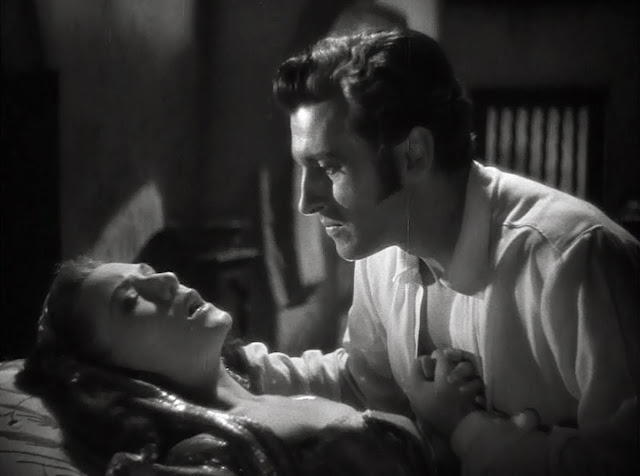Caravan
Another
of Gainsborough Studios wonderfully melodramatic Gothic romances, Caravan has everything that the viewer
might expect:
It’s
a tale of thwarted love between childhood sweethearts Richard Darrell and
Oriana Camperdene (Stewart Granger & Anne Crawford) ...
... who are separated by
the fiendish Sir Francis Castleton (Dennis Price) ...
... who marries Oriana after his
assistant Wycroft (Robert Helpmann) organises Richard’s murder whilst on a trip
to Spain. After Wycroft botches the killing ...
... Richard is nursed back to health
by Rosal (Jean Kent) a gypsy dancer.
This
being Gainsborough we have: a woman prepared to sacrifice herself for the man
she loves …
… a
heavy emphasis on sex …
…
an evily manipulative villain …
Not
forgetting a hero who could have set the standard for every Mills & Boon man that followed.
Let’s face it, we all know someone for whom a blood-drenched Stewart Granger -
shirt open to the waist, clad in figure-hugging trousers and wielding a whip -
is the epitome of male sexuality.
Yet
it’s not Granger who steals the show. There is only one star shining at their
brightest in Caravan: the late, great
Jean Kent.
She
may never have been the greatest actress (although she certainly proved herself
to be a very good actress) but she was unrivalled when it came to being a sex
symbol in a supporting role. As she later said “'If
producers opened a script and read, ‘A girl appears in cami-knickers,’ they
sent for me.”
For
the uninitiated, only familiar with modern actresses, don’t think Kiera
Knightly – think Gemma Arterton: an actress happy to play (and capable of
playing) a complete sauce-pot. In
taking the role of Rosal, the gypsy dancer, Kent propelled herself into serious
sex-symbol territory. After all, this was the role turned down by Britain’s
greatest-ever sex symbol Margaret Lockwood, as being a step too far.
So
in celebration of her recent passing at the age of 92, here’s Jean as we knew
and loved her:
This poster from the film's US release is currently available from the 'Rare Film Posters from Greg Edwards' website. (It's a long-established company. I've bought a number of posters from him over the years and the service is very good):

































































